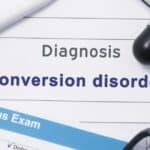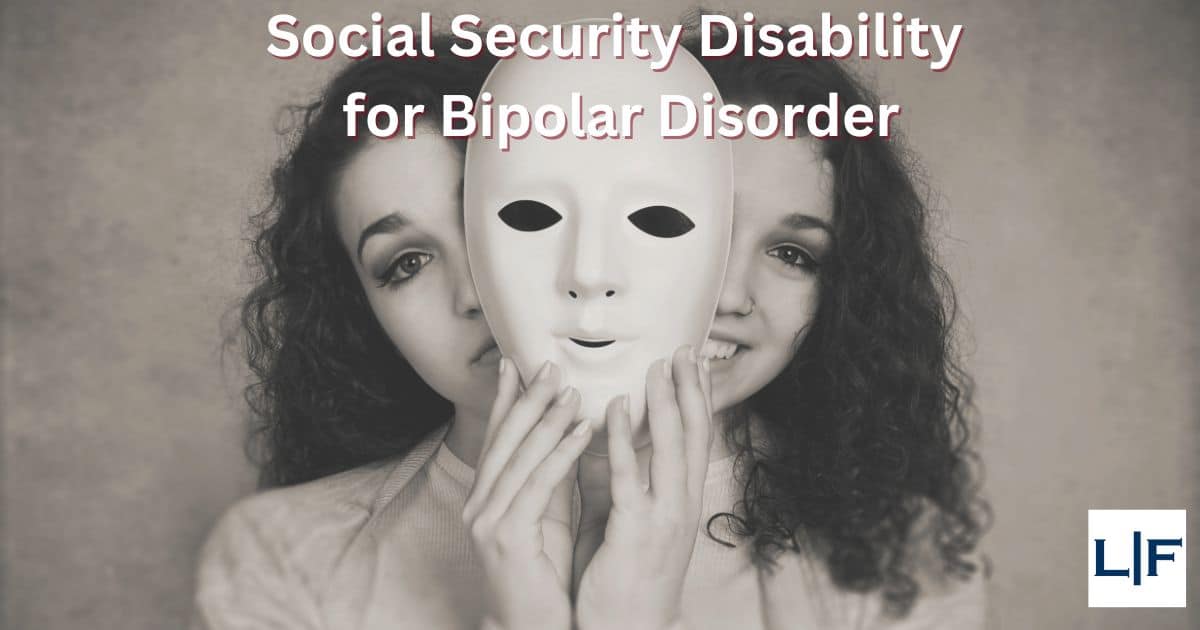Bipolar disorder, which used to be called “manic depression,” is a psychotic mental disorder that can cause significant impairments. It has cycles of feeling very happy and then being very sad. This is called cyclic mania. This mental illness is a subset of mood disorders rather than a single disorder. It is a disorder that affects both men and women. Adults who have symptoms that prevent them from working may qualify for social security disability benefits.
Often, bipolar disorder is diagnosed in the late adolescent or early adult years. Symptoms can occasionally manifest in younger people. Bipolar disorder typically requires lifetime therapy, even though the symptoms can change over time. People can improve their quality of life and improve their mental functioning by adhering to a prescribed treatment plan.
Symptoms of Bipolar
Bipolar Disorder symptoms typically manifest sometime between childhood and late adolescence.
The following behaviors can be indicative of manic episodes (or hypomania):
- greater level of activity, agitation, giddiness, or chatting
- inflated feelings of confidence
- experiencing euphoria
- decreased need for sleep
- racing thoughts or thoughts that will not stop
- inability to concentrate or pay attention
- making poor choices (i.e. impulsive shopping or investments, risky sexual behavior)
On the opposite side, depressive symptoms can include:
- severe feelings of emptiness, despondency, hopelessness and irritation
- loss of enthusiasm for all or most activities
- significant change in weight
- difficulty getting out of bed and insomnia
- delayed or sluggish thinking
- being worn out or lacking energy
- overwhelming feelings of worthlessness or unwarranted guilt
- difficulty thinking rationally, or inability
- suicidal thoughts
How is Bipolar Disorder diagnosed?
Bipolar disorder symptoms are challenging to prove and identify. Those with bipolar disorder who apply for disability payments are frequently initially denied because of this challenging diagnosis. This is due to the fact that episodes (symptoms) of bipolar disease frequently come and go in waves, and occasionally a person will experience no symptoms at all. Also, the symptoms must be conspicuously abnormal compared to the person’s typical range of mood and behavior. One of the four fundamental categories of bipolar disorder outlined in the Diagnostic and Statistical Manual of Mental Disorders is used by doctors to make the diagnosis.
Types of Bipolar Disorder
There are four primary types of bipolar disorder. They include:
1. Bipolar I Disorder: Manic episodes that persist at least seven days (almost every day for the majority of the day) or manic symptoms that are so severe that the person needs emergency medical attention are both indications of bipolar I disorder. Depressive episodes frequently happen too, lasting at least two weeks. A mixed episode of depression is one in which a person has both manic and depressive symptoms at the same time. “Rapid cycling” is when four or more manic or depressive episodes happen in one year period.
2. Bipolar II Disorder: This type of Bipolar Disorder has both depressive and manic episodes, but the periods of depression and mania are not as extreme.
3. Cyclothymic Disorder: This type involves numerous periods of hypomanic symptoms and depressive symptoms that last for at least two years but are not as severe as the symptoms observed in Bipolar I and II.
4. Other Specified and Unspecified Bipolar and Related Disorders: this type involves bipolar symptoms that do not meet the criteria for one of the other diagnoses.
Compliance with treatment and Bipolar Disorder
The Social Security Administration requires treatment compliance for all applicants. This means that the applicant has used all available therapies (medication, therapy, etc.) recommended by his or her treating physician or has tried to do so. The SSA will likely deny a claim if the applicant is not taking prescribed medication because they believe the drug could potentially improve and control the condition’s symptoms. The claimant may still be considered as complying with treatment if they attempted to take the medication(s) but ceased doing so due to unpleasant side effects.
Is Bipolar a disability that qualifies for Social Security benefits?
Yes, the Social Security Administration (SSA) includes affective disorders such as bipolar disorder in its Listing of Impairments under Section 12.04 .It is important to note that being on this list does not mean you automatically qualify for disability benefits. To qualify, you must prove that your symptoms are severe and meet detailed specifications on the listing or that they are so severe it prevents you from performing any type of work on a regular and continuing basis.
SSA requires that your condition meet one of the two following sets of requirements for it to deem you disabled based on the Listing requirements.
Evaluation Method #1 : As someone living with bipolar disorder, one way to meet the definition of disabled is to show that you have medically documented persistence of one of the following:“depressive syndrome characterized by at least four symptoms such as loss of interest in most activities, change in weight, sleep disturbance, decreased energy, difficulty concentrating, feeling of worthlessness, hallucinations, and paranoia;” “manic syndrome characterized by at least three symptoms such as hyperactivity; pressure of speech, inflated self-esteem, decreased need for sleep, easy distractibility, delusions, and involvement in activities that have a high probability of painful consequences which are not recognized;” or “bipolar syndrome with a history of episodic periods manifested by the full symptomatic picture of both manic and depressive syndromes (and currently characterized by either or both syndromes.”Your medical records must also show that you have at least two of the following: “Marked restriction of activities of daily living Marked difficulties in maintaining social functioning Marked difficulties in maintaining concentration, persistence, or pace; Repeated episodes of decompensation, each of extended duration”
Evaluation Method #2 : Alternatively, you can meet the medical requirements for disability if you have a medically documented history of a chronic affective disorder, which has lasted at least two years and has caused more than a minimal limitation of ability to do basic work activities. Despite adhering to recommended treatment, you must have at least one of the following:“Repeated episodes of decompensation, each of extended duration; A residual disease process that has resulted in such marginal adjustment that even a minimal increase in mental demands or change in the environment would be predicted to cause the individual to decompensate; or You have been unable to function outside a highly supportive living arrangement for a year or longer, and doctors think you will need to continue the arrangements.”
Can I qualify for disability for Bipolar Disorder in any other way?
Yes. If your medical records do not contain enough information to show that you meet the criteria for the Listing for Bipolar Disorder, you can still qualify for disability benefits. You will need to provide enough evidence that proves to SSA that you are unable to work at any full-time job (not just a job you had in the past) on a regular and continuing basis.
What other requirements to I need to meet to obtain disability benefits?
There are several basic criteria, aside from the ones above, that you need to meet for the SSA to deem you disabled and grant you benefits: Your condition must be expected to last a year or longer or result in death. Your disorder must severely impair your ability to work. The SSA will only approve you if you cannot work at your old job and you cannot adjust to new work. You also must meet certain financial or work history requirements, depending on the type of disability benefit for which you are applying. In order to get Social Security Disability Insurance (SSDI) benefits, you must have worked long enough at a job where you paid Social Security taxes. You will need a certain number of work credits to qualify for benefits, the exact number depends on your age. If you have not worked long or recently enough to qualify for SSDI , you can instead apply for Supplemental Security Income (SSI) , a different benefit for disabled persons with limited income and resources. With SSI, work history is unimportant, but your income and assets must fall below designated thresholds to qualify.
What kind of evidence do I need to meet the criteria for benefits?
When you apply for benefits, you will need to submit adequate medical evidence that proves the severity of your condition to win your claim. This will include your psychiatric record along with any documentation of manic or depressive episodes, in-patient treatment at a mental health facility, and records of the treatments you have underwent. You can also help substantiate your application with non-medical evidence, such as input from your employers, family members, and case workers about how your disorder has affected your ability to work. Medical, psychiatric, and supportive testimonies are the bedrock of a disability claim. It is essential to ensure your records sufficiently meet the SSA’s requirements or the Administration will deny your application for benefits. It is a good idea to contact a lawyer before submitting your claim. Our attorneys know what evidence the SSA is looking for in order to approve a claimant for benefits
What do I do if the SSA has denied my disability claim?
It is not uncommon for the SSA to deny claims, particularly for mental disorders, which are more challenging to prove with medical documentation. Fortunately, you have the right to appeal the decision , so long as you act within 60 days of receiving your letter of denial. Our Raleigh disability lawyers can help. At Lunn & Forro, PLLC, our job is to make sure that people with disabilities get the benefits they need. We have experience handling disability claims at every level, and we will fight to get you what you deserve. For questions about qualifying for disability benefits or for help with an appeal, call our office today to schedule a free, no-obligation consultation: 888-966-6566
Related Posts

Can I Get Disability for Diabetes?
The short answer to the question is yes, there are people who receive Social Security disability benefits for diabetes. However, they do not get disability

Is Schizophrenia a Disability? – Social Security Disability Benefits
Schizophrenia is a severe mental illness that affects about 1 percent of the population. However, it tends to run in families so someone with a

Can You Get Disability for Conversion Disorder?
Conversion disorder is a mental illness that causes neurological symptoms, such as paralysis or hearing loss. It is one of several conditions that fall under

Getting Social Security Disability For a Stroke
Each year, approximately 800,000 Americans experience a stroke, reports the Centers for Disease Control and Prevention (CDC). Strokes are a leading cause of disability among

Getting Social Security Disability for a Mental Illness
There are various mental illnesses that can qualify someone for disability benefits. In fact, approximately one-third of disability beneficiaries received a mental disorder diagnosis in
Disability for Anxiety and Panic Attacks
Disability for anxiety and panic attacks is available to individuals who cannot work due to the severity of their symptoms. Panic disorders are not uncommon.
Is BPD a Disability? – Qualifying for Payment
Some people who suffer from Borderline Personality Disorder qualify for disability benefits. Personality disorders are characterized by unhealthy and rigid thoughts and behaviors that greatly
Is PTSD a Disability?
Post-traumatic stress disorder (PTSD), which can develop after exposure to an extremely traumatic event, is not uncommon. According to the Department of Veterans Affairs (VA),
Is an Eating Disorder a Disability?
Can I get disability for an Eating Disorder? Eating disorders can cause a host of mental, emotional, and physical symptoms that can lead to serious
What Physical Conditions Qualify for Disability?
If you have a physical disability that keeps you from working, you may be eligible for monthly Social Security disability benefits. Below, we discuss a



